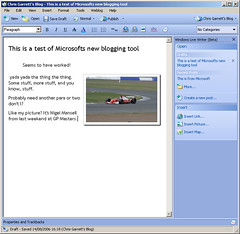Those of you who have been blogging for a while have learned a thing or two about the visual aspects of blog writing. Then there’s the issue of picking the right “voice” to write in. New bloggers, on the other hand, may not have learned this yet – even when they’ve already written for print.
The problem, it appears, is that as online readers, we seem to have less patience for reading large amounts of text, especially if it’s hard to read. That covers a few aspects, including wording, grammar, sentence structure and visual density. Here are a few suggestions to get past these problems.
- Watch the run-on sentences. Unless you’re describing dense subjects or explaining processes, long sentences are not welcome on a blog. I have a tough time describing a run-on sentence in print, but they seem so common in the blogosphere that I wonder if English teachers stopped teaching sentence structure in high school.
I don’t want to get into a discussion about sentence fragments and such. That’s not my style or forte. If you suspect you have a run-on sentence, read it aloud. If you can’t do so without taking many breaths, you might have a run-on sentence. Then ask a friend with better grammar skills than yourself. Most blog visitors will not tell you.
- Use visual variety. No one is going to stick around and read your blog if your paragraphs are 20 or 30 sentences long. Online text does not lend itself well to speed reading because most of it is sans serif. Unfortunately, serif fonts do not look very inviting on a computer screen. My eyes go buggy reading screens of text every day, and gigantic paragraphs don’t help.
Make your writing visually inviting by using a variety paragraph lengths, line breaks and bullet lists. Add <h2>, <h3>, etc., headings and embolden or italicize keywords. If you use bullet lists and say “here are five reasons,” then you better number your bullets. If you don’t mention a count, plain unnumbered bullets are fine.
- Write accessibly.
Your level of language may be at the post-graduate level, but this is generally not a good idea for most blogs. Be inviting. Don’t force your average reader to check a dictionary every few seconds. Unless that’s what your blog is about. - Write cohesively.
This is especially important for very long posts. It’s easy to meander, topically. The best way to approach a post you feel is going to be long is to start with an outline, even with a mindmap. Expand from there. Because you start with cohesion (an outline or a mindmap), you will very likely end with cohesion. - Use varying post lengths.
If you post more than once per day, vary the word count of posts. Three to five giant articles daily isn’t going to gain you a lot of subscribers, unless you are providing must-have information not available elsewhere. Especially if you’re violating some of the above rules. - Edit ruthlessly.
If you’ve only started writing as a blogger, and never in print, you very likely don’t even understand the editing process. If you want your writing to have impact, to reach people, edit yourself. Go back over what you wrote. Does it say what you really want it to say? Do you have variety in your sentence lengths?Edit both short and long posts. It’s not easy when you’re rushed for time, and I’m as guilty as anyone, but it’s a must, long-term, if you want to gain credibility for your writing.
- Set it aside.
We all make mistakes in our writing, but what separates the good writers from the bad is that the former revise their work from time to time. This is the reason I prefer not to post something on the same day that I wrote it. When time permits, I’ll write my next day’s posts today, or at least wait a few hours before posting.
I don’t want to give the impression that I have 100% perfect English grammar because I don’t. (I also sometimes like to violate some grammar rules for impact because that’s my fiction/ storytelling style and it’s creeped into my non-fiction writing.) Having grown up speaking in multiple languages, I find that grammar from other languages will sometimes assert itself on my English writing, no matter how hard I try. But for that very reason, I’ve always made a concerted effort to edit my writing, in hopes of improving it. That doesn’t mean that there aren’t semi-illiterate bloggers doing very well, however. So ultimately, you’ll have to decide how important the above suggestions are to you.

